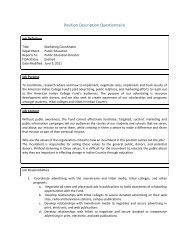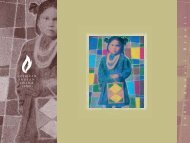2009-10 Annual Report - American Indian College Fund
2009-10 Annual Report - American Indian College Fund
2009-10 Annual Report - American Indian College Fund
You also want an ePaper? Increase the reach of your titles
YUMPU automatically turns print PDFs into web optimized ePapers that Google loves.
The Andrew W. Mellon Foundation Promotes<br />
Faculty Growth at Tribal <strong>College</strong>s<br />
Diana Canku<br />
Thomas Antell<br />
Turtle Mountain<br />
Community <strong>College</strong><br />
was founded in 1972<br />
and serves the Turtle<br />
Mountain Band of<br />
Chippewa. The college<br />
offers a baccalaureate<br />
degree in teacher<br />
education, two<br />
associate’s degrees<br />
and eight technical<br />
certificates. The<br />
school is working to<br />
preserve Ojibwa, the<br />
traditional language<br />
of the Anishinaabe<br />
people, and Michif,<br />
a mixed language<br />
based on French,<br />
Cree, and Ojibwa.<br />
Diana Canku (Sisseton Wahpeton Oyate),<br />
president of Sisseton Wahpeton <strong>College</strong> (SWC)<br />
in South Dakota and a <strong>2009</strong>-<strong>10</strong> academic year fellow<br />
in the <strong>American</strong> <strong>Indian</strong> <strong>College</strong> <strong>Fund</strong>’s Andrew<br />
W. Mellon Career Enhancement Program, became<br />
the fifteenth program participant to complete her<br />
doctorate degree.<br />
The program was funded by the Andrew W.<br />
Mellon Foundation to increase the number of faculty<br />
possessing a terminal degree at the nation’s 33 tribal<br />
colleges and universities. Under the program, each<br />
faculty fellow is provided with financial assistance to<br />
complete the dissertation writing process. The objective<br />
is to increase intellectual capital, job satisfaction<br />
and retention among faculty at the tribal colleges.<br />
In February the foundation announced a renewal<br />
grant for $450,000 to continue the program, which<br />
has funded 17 tribal college faculty Ph.D. candidates<br />
to date, including three in <strong>2009</strong>-<strong>10</strong>.<br />
Dr. Canku says, “I find working in the field of<br />
education to be the most rewarding area that I have<br />
worked in to date… My long-term plans are to continue<br />
working here at SWC teaching until I retire.”<br />
The foundation is also providing research opportunities<br />
in <strong>Indian</strong> country with a $500,000 renewal<br />
grant for the Andrew W. Mellon Foundation<br />
Faculty Research Program. Despite being one of the<br />
fastest-growing populations in America, Natives were<br />
often excluded from academic research, resulting in<br />
inaccurate or irrelevant data on <strong>American</strong> <strong>Indian</strong>s. The<br />
faculty research program allows Native professors to<br />
conduct research at their schools and in their communities,<br />
putting them in the rightful place of telling<br />
the <strong>Indian</strong> story and increasing the number of faculty<br />
research projects within the tribal colleges.<br />
Program fellowships give tribal college faculty<br />
funds and time off to complete scholarly research<br />
projects, prepare publications and present research at<br />
national conferences with the support of a tribal college<br />
student research assistant. To date, eight faculty<br />
research fellowships have been awarded, with two this<br />
fiscal year.<br />
Thomas Antell (Minnesota Chippewa) is a <strong>2009</strong>-<br />
<strong>10</strong> faculty research fellow focusing on how data on<br />
<strong>American</strong> <strong>Indian</strong>s was collected in anthropology.<br />
After moving to the Lac Courte Oreilles Ojibwe reservation<br />
to attend at the tribal college, Antell noticed<br />
that the classroom, which was once used to destroy<br />
Native culture, “was now being used just as effectively<br />
to restore what was stolen.” Later, as a professor<br />
there, to accurately preserve his culture, he decided<br />
to research and reevaluate source material about the<br />
Ojibwe people and develop a response to anthropological<br />
history that was written by non-Natives. His<br />
research is allowing the Ojibwe to provide its own<br />
narrative of their culture to future generations.<br />
16


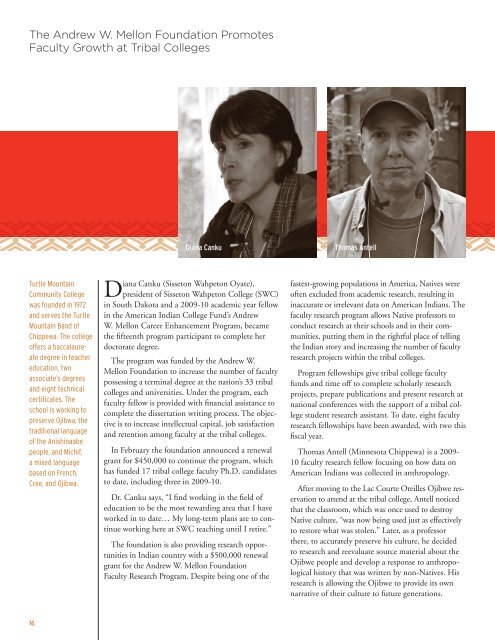
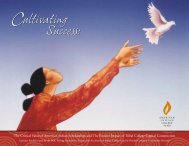
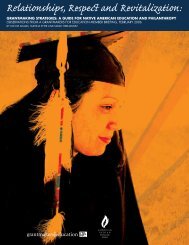
![2004 Annual Report [PDF 6.6MB] - American Indian College Fund](https://img.yumpu.com/43262083/1/190x143/2004-annual-report-pdf-66mb-american-indian-college-fund.jpg?quality=85)
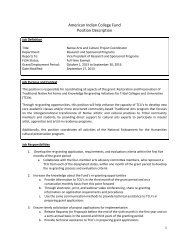
![2007-2008 Annual Report & Audited Financials [PDF 6.1MB]](https://img.yumpu.com/38401517/1/190x248/2007-2008-annual-report-audited-financials-pdf-61mb.jpg?quality=85)
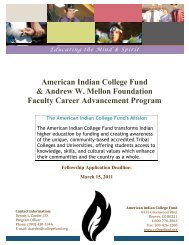
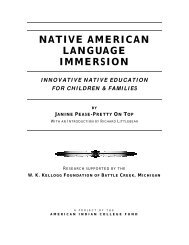
![Final Report [PDF 7.4MB] - American Indian College Fund](https://img.yumpu.com/38401472/1/190x245/final-report-pdf-74mb-american-indian-college-fund.jpg?quality=85)
